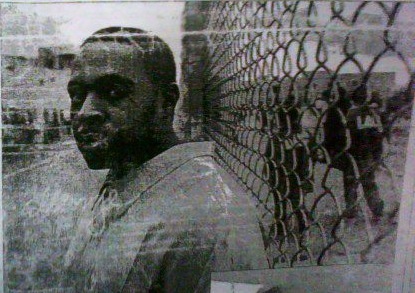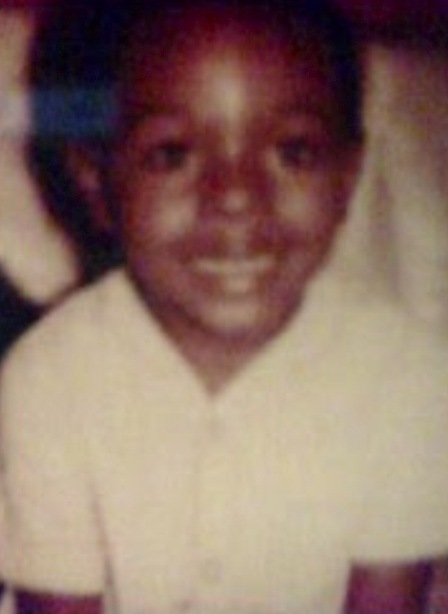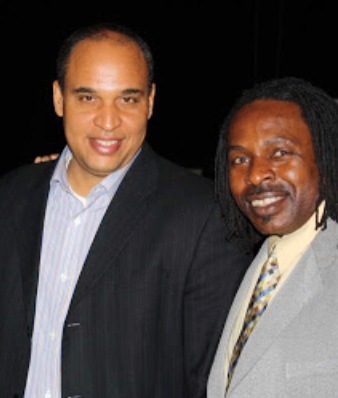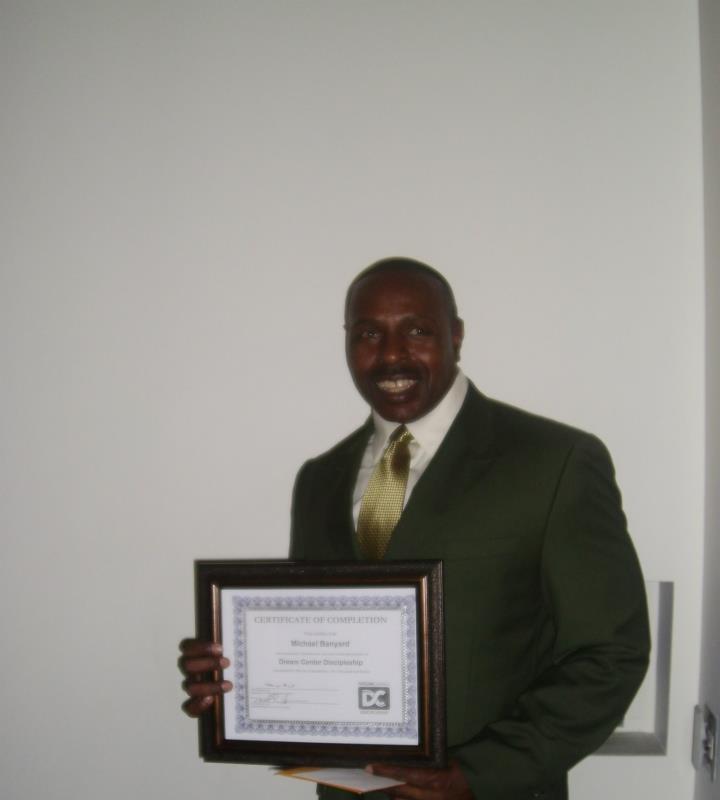Michael Banyard-People You Should Know
People You Should Know, People You Should Know/Pg 2 — By Buddy Sampson on April 12, 2013 at 6:44 pm

Cover Photo- Michael Banyard graduating from the Los Angeles Dream Center Discipleship Program. Photo by Phyllis Wade Moore. Inside photo- Michael Banyard(L) with Judge Letts.
Michael Banyard’s story is one of perseverance, redemption and success. His efforts in the community have been recognized by The White House, some of the text published in this article.
In June 2012, National Drug Control Policy Director Gil Kerlikowske visited the Betty Ford Center, one of the Nation’s oldest and most recognized addiction treatment facilities. There he gave remarks to a crowd of leaders in the field of recovery. In the audience were two special guests—Michael Banyard and Federal District Court Judge Spencer Letts. In his remarks, Director Kerlikowske mentioned Banyard’s improbable—and inspirational—journey from crack cocaine dependence and homelessness, to prison, to a successful sentence appeal, to the chambers of a federal district court judge and completion of his GED.
Michael Banyard has graciously shared his story—in his own words—with ONDCP, which we are posting in conjunction with National Mentoring Month. Please find Michael’s story below:
I was a young man born in Compton, California and raised by a single loving mother. I made a lot of bad decisions; even though my mother raised me right and worked hard to make sure I always had a roof over my head and food on the table.
Although I had my mom and two sisters, I still felt alone and would play by myself a lot. I was the only male in the house and felt like I was missing a father figure, so I began looking for guidance outside my home.
It was around the age of 12 that my mom started taking me to church. By then, I had already smoked my first joint and had my first drink of alcohol. Around the age of 16, I stopped going to church and went after what I thought I was missing in my life. This led me to a lot of negativity.
My drug and alcohol use got worse, and I became completely detached from school. In 1985, I finally dropped out, and during that same year, I smoked crack cocaine for the first time.
Crack cocaine took my life to another level. I always thought drugs were for fun, but I had no idea it would lead to making me homeless and would have my mind focused on drugs every second of every day. From 1987 to 1995, I ended up in prison five times, and was already in my first four drug programs. Also in that period, I became homeless for the first time. And by 1996, I went back to prison and was convicted of possession and sentenced under the California “Three Strikes” law to a whopping term of 25 years to life.

Michael during his incarceration, facing a 25 year-to-life sentence under California's "Three Strikes" law (Photo courtesy of Michael Banyard).
I was sent to a high security prison called Pelican Bay. While at Pelican Bay, another lifer had one day told me, “You won’t feel the life sentence until after your first 10 years.” Even though I had been to prison before, I could not see myself behind bars for ten years straight.
After a couple years my custody points dropped, and I became a level three inmate and was allowed to transfer to a lower level three yard. I relocated to Lancaster State Prison in L.A. County.
While at Lancaster Prison I became the G.E.D. Clerk, and while working one day, I overheard the correctional officer talking to her workers. She said, “The sun rotates, and while the sun is rotating, the earth is rotating around the sun, and while that is happening the moon is rotating around the earth.”
When I pictured that in my head I thought to myself, “Whoever is in control of that has the last say on whether I spend the rest of my life in prison.”
After work I got on my knees and had a long talk with God. The first thing I felt I had to do was take responsibility for the role I played in my situation. Second, whoever I felt may have wronged me; I had to inwardly forgive them before I could move on.
That inner freedom allowed me, a high school drop-out, to start going to the Prison Law Library and studying for the first time.
Although I had no idea what I was doing, studying law brought this inner peace that made me feel that everything was going to be alright.
I filed petitions for a writ of habeas corpus, a writ of coram nobis, and a writ of coram vobis.
I somehow never doubted that God would deliver me, and I continued to pray for approximately nine years before my petition made it through the state courts and to the federal court, where Senior Federal Judge J. Spencer Letts of the California Central District Court ruled in my favor and GRANTED my writ of habeas corpus, ruling and writing an opinion on all four of claims (see Banyard vs. Duncan opinion here.)
Shortly after I was released from prison, around the beginning of 2005, I received what was probably the first email in my life. It was from the Federal Court. They gave me a phone number to call Judge Letts’ chambers. I was nervous when I called, but his clerk, Nancy Webb, made sure I understood that nothing had changed, and I was not in trouble.
On the day I arrived and walked into the chambers of Senior Judge Letts, he and his staff gave me a warm and friendly welcome. I knew I was around people who loved to help people. We talked for some time, and before I left, Judge Letts asked me how I felt about going with him to speak to the teens at L.A. High School to share my experiences in a way that would encourage them to go down the right path in their lives and not make some of the choices that I did.
I said, “Yes.”
I had never done anything like that in my life, but it felt more than right, and I never felt so sure about anything before in my life. It felt like all that I had went through in my life, being shot and partially paralyzed, going head first through car windshields, and more, was all for this purpose—to help others avoid being blinded by the outcome of poor choices.
I was very successful and rose to the occasion. Things went so well that Kurt Streeter of the L.A. Times wrote a front page, two-part article that covered the judge’s and my friendship and the work we were doing with the youth at S.E.A. High School.
It was clear that, like Judge Letts, I too was a person who loved helping people. I was not a homeless drug addict who could never get it right, but someone who could really be happy if I continued to strive for perfection. I was happy I was making a difference in the life of these teens.
Michael Banyard continues to make a difference in the community. A former gang member, he is the founder of Each One, Reach One, Teach One and now the Director of the Dream Center Mentoring program for children of incarcerated parents. His story of inspiration and rise to success coupled with his efforts to help others make Michael Banyard one of the People You Should Know.
Need help, want to improve your life and help others? Visit:




 Tweet This
Tweet This Digg This
Digg This Save to delicious
Save to delicious Stumble it
Stumble it




